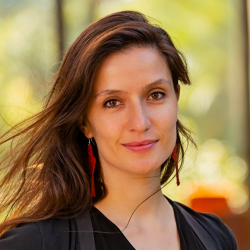
Please join the Global Theory Workshop as they host Yuna Blajer de la Garza, Assistant Professor of Political Science at Loyola University Chicago, for a presentation titled "Unequal Belonging and Undermined Freedom."
ABSTRACT: As a descriptive concept of political membership, belonging has been paradoxically marginal in political theory, despite its widespread usage in ordinary language to describe inclusion (or lack thereof). To discuss why belonging matters politically, in this article, I highlight one of the political consequences of unequal belonging. Unequal belonging notwithstanding equal rights, I argue, infringes upon the ability of otherwise equal citizens to behave freely. In choosing among different courses of action, the “citizen who does not belong” is more likely to eschew behaviors and opinions she knows might exacerbate the likelihood of being perceived as an interloper, regardless of her equal citizenship. For example, a Mexican-American citizen otherwise meticulously cautious about masking during the Covid pandemic might refrain from wearing a mask in the mall of a town where most people are virulent anti-maskers. After 9/11, a Muslim American woman might overly perform her Americanness in the airport, fearing how others might read her as an interloper. In both cases, the cost of being perceived as someone who does not truly belong compounds the cost of other behaviors, a concern others citizens need not consider. I discuss how unequal belonging undermines a person’s freedom through three definitions of freedom: Isaiah Berlin’s definition of positive freedom as self-mastery, Philip Pettit’s definition of freedom as the absence of domination, and Hannah Arendt’s freedom to act in public.
BIorgraphy: Professor Blajer’s research and teaching focus on contemporary political theory. She studies inequalities in democracies by examining how democratic institutions are translated (or distorted) into everyday practices and norms. She is interested in debates of democratic and critical theory, relational egalitarianism, citizenship, nationalism, and the “side-effects” of otherwise desirable formal institutions, among other things. Methodologically, she combines normative political theory and ethnographic methods; and has carried out research in Mexico and France. Her research has been published or is forthcoming in the Journal of Politics, Politics and Society and the European Journal of Political Theory, among others. In 2022, she received the Carlo Argenton Memorial Prize for the best research article published in the EJPT that year. Alongside Dr. Condon and Dr. Schmidt (from the School of Education), she is co-PI for Speak Up Democracy, a multi-year project sponsored by a generous grant from the Teagle Foundation. She is currently working on a book on belonging and citizenship in contemporary democracies. Before joining Loyola, she was a postdoctoral fellow at the Center for Ethics in Society at Stanford University.
Audience
- Faculty/Staff
- Student
- Post Docs/Docs
- Graduate Students
Interest
- Academic (general)